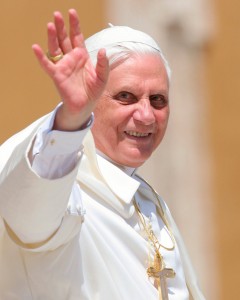Back in 2005, just after Pope Benedict XVI took over leadership of the Catholic Church, my local newspaper came out with the following headline:
“Centuries of Catholicism and Still No American Pope”
From a historical perspective, this is a rather curious headline. What, the Catholic Church has slighted Americans for more than two millennia now? I guess that back in the 7th or 11th or 15th centuries, if the Catholic Church had just tried hard enough, it could have figured out how to make a Navajo or a Cherokee or a Shawnee a pope. Instead, those cardinals just kept picking some Italian guy.
OK, that curious headline could just be the result of a local editor who was in a hurry and wasn’t thinking clearly. But it reflects a very real way of thinking: many Americans, whether they are Catholic or not, assume that the Catholic Church really ought to put a priority on listening to American Catholics.
Really? Why should Americans be top dog in this fight? Why should we think that the Catholic Church ought to choose an American as pope in the first place? Consider this: American Catholics make up 6% of the Catholics in the world. Brazil, Mexico and the Philippines have more Catholics in their nation than the United States does. If anyone deserves to make an argument based on national identity it would be one of these other nations. (Actually, it is problematic to try to define Catholicism, or any branch of Christianity for that matter, by national identity, but that’s a discussion for another time).
I don’t know who will be the next pope. (I am intrigued that a Nigerian, Francis Arinze, has been discussed as a candidate. That would be an interesting selection.) And I don’t know what the conclave thinks about these issues of national identity. As a Protestant, I will leave that for the Catholics to work out among themselves. (I’m sure the Vatican is relieved). However, it is worth pointing out how our identity as Americans can sometimes lead us to take a rather self-centered view of things.
For instance, one might think that The New York Times, a cosmopolitan paper of some sophistication, with very good international news coverage, would take a global view of the Catholic Church. But one would be wrong. With the upcoming selection of a new pope on
its mind, The New York Times released the results of a poll on Wednesday morning of this week. The Times polled American Catholics, asking what they thought of the Church and the pope. The tenor of the story was that many American Catholics want a younger pope who is more open to what the Times calls “modern” ideas – and that the church hierarchy today is out of touch with the people. Being good journalists, the Times story included quotes from ordinary Catholics in ordinary places like Des Moines, Iowa. They quoted a Catholic woman from Fort Wayne, Indiana who said the cardinals are not in touch with their lives. “I don’t think they are in the trenches with the people,” she said.
Now, this is a helpful article and poll, in some ways. We learn what American Catholics think. We have a problem, though: the article never mentioned Catholics outside of the U.S. The Times never mentioned that American Catholics only make up 6% of the global Catholic population. The underlying assumption of the article? The Catholic Church ought to listen to Americans.
If we really wanted to know what ordinary Catholics believe, we don’t go to Fort Wayne and Des Moines. We go to Sao Paulo and Manila and Nairobi. And what do the Catholics in Brazil and the Philippines and Kenya want? Do they agree with American Catholics, or do they want something else? Do these people agree that they want a younger, more modern pope? Do they think that cardinals are out of touch with the people in the trenches? Maybe, maybe not. What do they want in a new pope? We don’t know. I wish we did.
The New York Times doesn’t get it. (It gets some things, but religion is usually not one of them). Assuming that American Catholics ought to have top priority in shaping the Catholic Church is like assuming that the state of Georgia ought to have top priority in shaping the policies of the federal government in Washington D.C.
We need to recognize that world Christianity challenges Americans and Europeans just by its very existence. We misread the world if we continue to assume that Christianity is primarily a western religion. Africa now has more Christians (380 million) than the United States has people (300 million). Asia has 320 million Christians and Latin America has 480 million. The center of gravity of Christianity, ladies and gentlemen, has shifted from North America and Europe to Africa, Latin America and Asia.
You know what that means for American Christians? We are outnumbered. We are a minority in our own faith.
Quite frankly, this is a painful reality for us to digest. We Americans, especially if we are white, are not used to thinking about being outnumbered. We tend to view the world through the political, economic and cultural power of the United States. Sometimes we think that the whole world revolves around us. Yes, the Christian virtue of humility is a really, really difficult thing to attain. I have a very difficult time with humility, personally. (Hmm. Perhaps my snarkiness in this very blog is evidence of this.) America, as a culture, has a very difficult time with humility, as well. It will take quite a bit to get us to shed these forms of self-centeredness.
My litmus test: we will have made a huge step forward when my local newspaper comes out with a headline that says, “Centuries of Catholicism and Still No Filipino pope.”



Did you have a mole in the conclave? Great thought provoking (foreshadowing) essay.